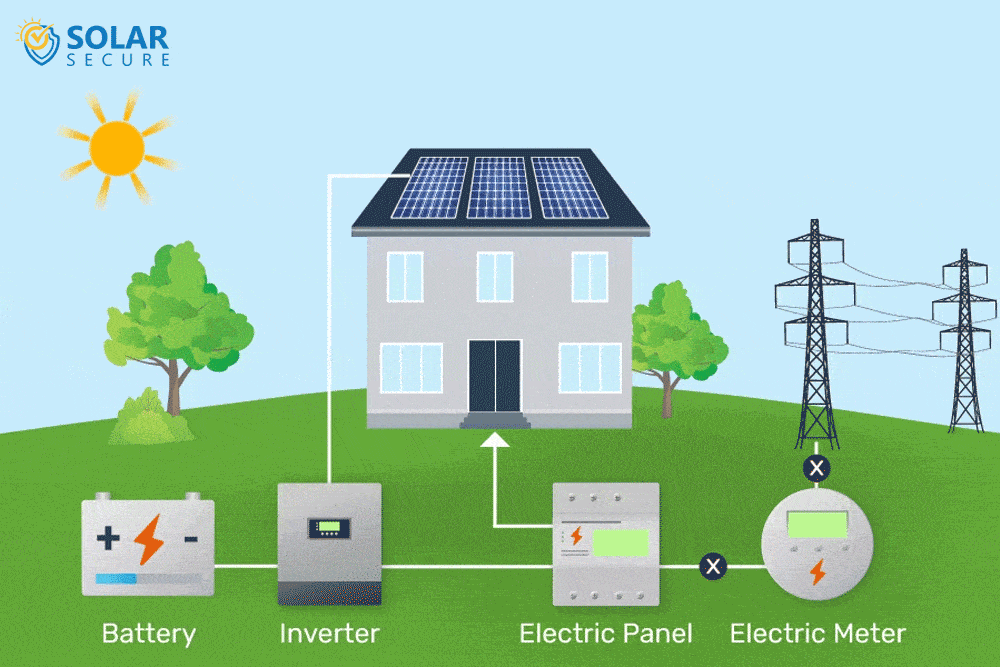A solar battery backup is a system that allows you to store energy generated by solar panels in a battery so that it can be used later when there is no sunlight available. This type of system is commonly used in homes and businesses that have solar power systems installed to provide a reliable source of backup power during power outages or when the solar panels are not generating enough electricity to meet the demand.
The solar battery backup system consists of solar panels, an inverter, and a battery bank. During the day, the solar panels generate electricity from the sun and send it to the inverter. The inverter converts the direct current (DC) electricity produced by the solar panels into alternating current (AC) electricity that can be used to power appliances and other devices.
The excess electricity generated by the solar panels is then stored in the battery bank, which can be used later when the sun is not shining, such as at night or during a power outage. The battery bank typically consists of a series of deep cycle batteries that are designed to store large amounts of energy and provide a reliable source of backup power.
A solar battery backup system provides a cost-effective and environmentally friendly solution for storing and using solar energy, and it can help to reduce reliance on traditional grid-connected power sources.
A solar home battery backup system works by storing excess energy generated by solar panels during the day and using it to power your home during periods of low solar production, such as at night or during cloudy weather.
The battery backup system consists of one or more rechargeable batteries that are connected to your solar panels and your home's electrical system. During the day, the solar panels generate electricity and send it to the battery backup system to charge the batteries.
Once the batteries are fully charged, any excess energy is sent back to the grid, where it can be sold back to your utility company through a process called net metering.
When your solar panels are not generating enough electricity, such as at night or during cloudy weather, the battery backup system automatically switches to the stored energy in the batteries to power your home. This provides you with a reliable source of electricity, even during power outages or other emergencies.
A solar home battery with backup refers to a battery storage system that allows you to store excess solar energy generated during the day for use when there is no sunlight or when there is a power outage. The backup feature means that the battery can supply power to your home during an outage, providing you with a reliable source of electricity.
On the other hand, a solar home battery without backup is simply a battery storage system that stores excess solar energy generated during the day, but does not have the capability to provide power during an outage. This type of system is designed to help you reduce your reliance on the electricity grid and can also help you save money on your energy bills.
Another difference between a solar home battery with backup and without backup is the size of the battery. Typically, a battery with backup will have a larger storage capacity than one without backup because it needs to be able to provide power for a longer period of time.
In terms of cost, a solar home battery with backup is generally more expensive than one without backup due to the additional features and larger size. However, the cost can vary depending on the brand, capacity, and features of the battery.
Another factor to consider is the level of complexity involved in the installation and maintenance of the battery. A solar home battery with backup may require additional installation and maintenance procedures to ensure the backup function works properly, whereas a battery without backup may be simpler to install and maintain.
Overall, the decision between a solar home battery with backup and without backup depends on your specific needs and circumstances. If you live in an area with frequent power outages, or if having backup power is important to you for safety or other reasons, then a battery with backup is likely the better choice. However, if you're mainly looking to reduce your reliance on the grid and save on energy bills, a battery without backup may be sufficient for your needs.
Is there much difference in the price when installing a solar home battery with backup or without backup?
Yes, there can be a significant difference in the price of a solar home battery system with backup versus without backup.
A solar home battery system without backup typically only provides energy storage for excess solar energy generated during the day, which can then be used at night or during periods of low solar generation. These systems typically cost less than those with backup because they do not require the additional components necessary for backup functionality, such as a transfer switch, backup inverter, and backup generator (if desired).
On the other hand, a solar home battery system with backup provides energy storage for both excess solar energy and grid electricity, allowing you to power your home during power outages. These systems require the additional components mentioned above, which can significantly increase the cost of the system.
The exact price difference between a solar home battery system with backup versus without backup will depend on factors such as the size and type of battery, the inverter and other system components, and the cost of installation. It is recommended to obtain quotes from multiple reputable solar installers to get a more accurate idea of the cost difference for your specific situation.
When deciding whether to get a solar home battery installed with or without backup, here are some questions you may want to ask yourself:
- What is your motivation for getting a solar home battery? Are you primarily interested in reducing your reliance on the grid, saving money on electricity bills, or reducing your carbon footprint?
- How reliable is your current power supply? Are power outages common in your area, or do you experience them only rarely?
- How much electricity do you typically consume in a day? A battery with backup capabilities may be more useful if you use a lot of electricity and want to ensure that your power supply is uninterrupted during an outage.
- How much space do you have available for a battery installation? Some batteries may require more space than others, so it's important to consider your available space when selecting a battery.
- What is your budget for a solar home battery system? Batteries with backup capabilities are typically more expensive than those without, so you'll need to factor in the cost when making your decision.
- How long do you plan to stay in your current home? If you plan to move in the near future, it may not be worth the investment to install a solar home battery with backup capabilities.
- How important is it to you to have a reliable backup power source in the event of an outage? If you have medical equipment that requires electricity or have other critical needs, a battery with backup capabilities may be a more attractive option.
Considering these questions can help you make an informed decision about whether to get a solar home battery installed with or without backup capabilities.





